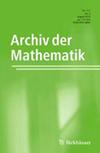On conciseness of the word in Olshanskii’s example
IF 0.5
4区 数学
Q3 MATHEMATICS
引用次数: 0
Abstract
A group-word w is called concise if the verbal subgroup w(G) is finite whenever w takes only finitely many values in a group G. It is known that there are words that are not concise. In particular, Olshanskii gave an example of such a word, which we denote by \(w_o\). The problem whether every word is concise in the class of residually finite groups remains wide open. In this note, we observe that \(w_o\) is concise in residually finite groups. Moreover, we show that \(w_o\) is strongly concise in profinite groups, that is, \(w_o(G)\) is finite whenever G is a profinite group in which \(w_o\) takes less than \(2^{\aleph _0}\) values.
关于奥尔尚斯基所举例子中词语的简洁性
摘要 如果在一个群 G 中,当 w 只取有限多个值时,其言语子群 w(G) 是有限的,那么群词 w 就被称为简洁词。Olshanskii 举例说明了这样的词,我们用 \(w_o\) 表示它。在残差有限群类中,是否每个词都是简洁的,这个问题仍然悬而未决。在本文中,我们观察到 \(w_o\) 在剩余有限群中是简洁的。此外,我们还证明了 \(w_o\) 在无限群中是强简洁的,也就是说,只要 G 是一个无限群,其中 \(w_o\) 的取值小于 \(2^{\aleph _0}\) 值,那么 \(w_o(G)\) 就是有限的。
本文章由计算机程序翻译,如有差异,请以英文原文为准。
求助全文
约1分钟内获得全文
求助全文
来源期刊

Archiv der Mathematik
数学-数学
CiteScore
1.10
自引率
0.00%
发文量
117
审稿时长
4-8 weeks
期刊介绍:
Archiv der Mathematik (AdM) publishes short high quality research papers in every area of mathematics which are not overly technical in nature and addressed to a broad readership.
 求助内容:
求助内容: 应助结果提醒方式:
应助结果提醒方式:


